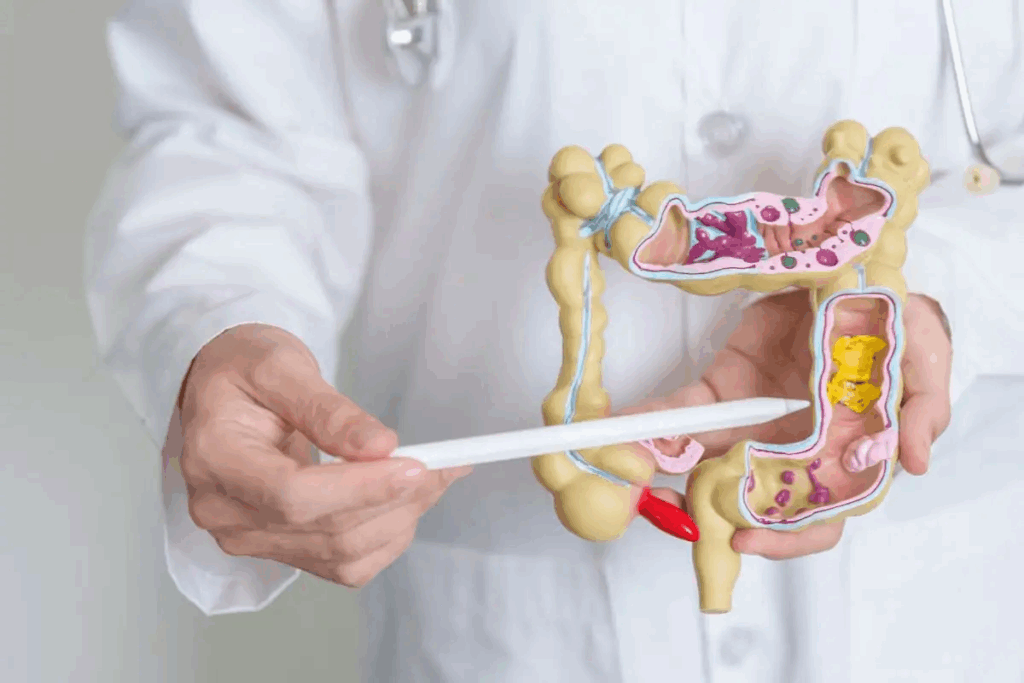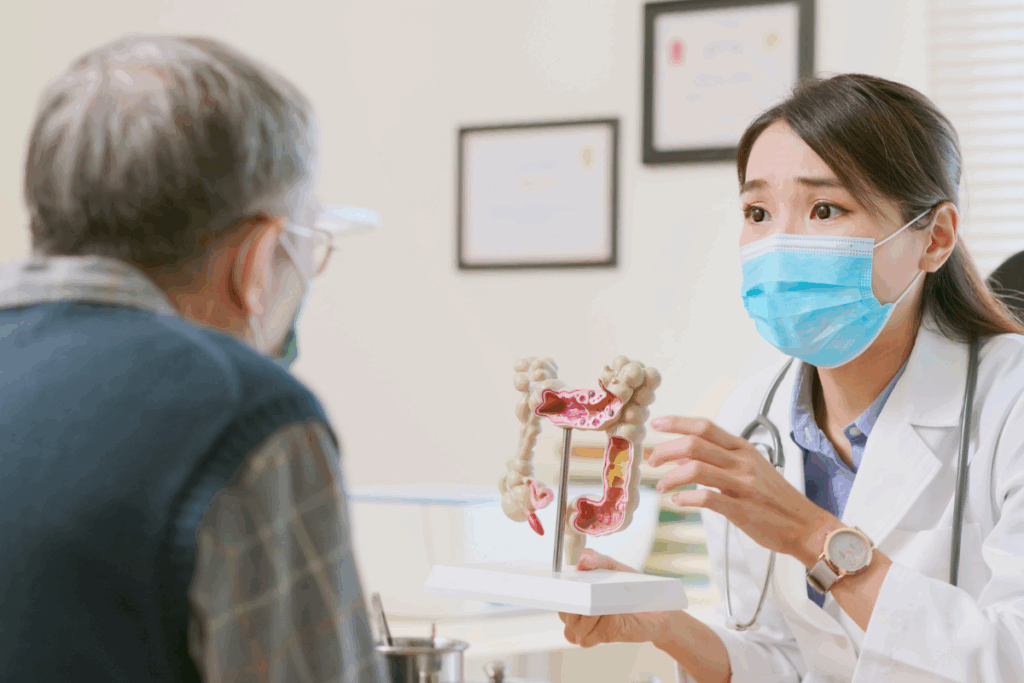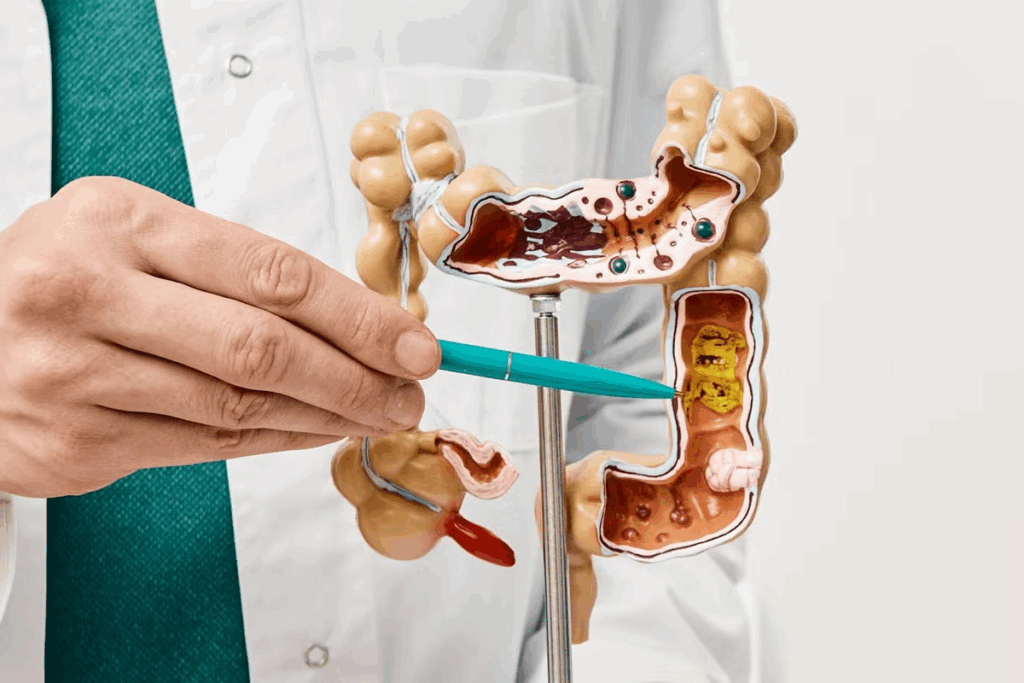Last Updated on October 30, 2025 by Bilal Hasdemir

Colon polyps are growths on the inner lining of the colon or rectum. They often don’t show symptoms, making them hard to find without tests. But, bigger polyps might cause abdominal discomfort or changes in how you go to the bathroom. Find what is the symptoms of colon polyps and how to detect early signs before they progress.
Getting regular tests is key because colon polyps caught early can be safely removed. At Liv Hospital, they focus on finding polyps early and providing top-notch care. This helps patients understand what bowel polyps are and why they matter.

Knowing about colon polyps is key to keeping your colon healthy. These growths can turn into colorectal cancer. Most colon polyps are harmless, but some can become cancerous over time.
Colon polyps are abnormal growths on the colon’s inner lining. They can be harmless or turn into cancer. These growths often come from genetic changes and environmental factors.
Types of Colon Polyps:
Bowel polyps are common in adults, more so with age. About 15 to 40 percent of adults over 50 have them.
| Age Group | Prevalence of Colon Polyps |
| Under 50 | Less common, often associated with genetic factors |
| 50 and above | 15% to 40% prevalence, increasing with age |
The risk of getting colon polyps goes up with age. Regular screenings are vital for catching them early and preventing cancer.

Knowing the risk factors for colon polyps is key to preventing and catching them early. Colon polyps are growths inside the colon or rectum. While most are harmless, some can turn into colorectal cancer over time.
Age is a big risk factor for colon polyps. The chance of getting them goes up after 50. Genetic predisposition also matters a lot. If your family has a history of colon polyps or cancer, you’re at higher risk.
Genetic syndromes like Familial Adenomatous Polyposis (FAP) and Lynch syndrome raise your risk even more.
Lifestyle choices can also affect your risk. Smoking and drinking too much alcohol can increase your risk. Eating too much fat, and not enough fiber, can also play a part.
Medical conditions like inflammatory bowel disease (IBD) can also raise your risk. This includes Crohn’s disease and ulcerative colitis.
Other factors include having had polyps or cancer before, diabetes, and obesity. Knowing these risks helps you take steps to prevent them. Regular screenings can catch polyps early.
Colon polyps can show specific symptoms that lead to early medical care. Many people with colon polyps don’t show symptoms. Knowing the signs can help catch problems early.
The symptoms of colon polyps can differ, but some common ones are:
These signs can point to colon polyps, but they might also mean other health issues. Always see a doctor for a proper check-up.
Many colon polyps don’t show symptoms, making regular checks important. This is because some polyps are small or hidden in the colon. As polyps grow, they can start to cause symptoms.
| Symptom | Description | Possible Indication |
| Blood in Stool | Presence of blood in feces or on toilet paper | Colon polyps or colorectal cancer |
| Changes in Bowel Habits | Constipation, diarrhea, or narrow stools | Polyps obstructing the colon |
| Abdominal Discomfort | Pain or discomfort in the abdominal region | Large polyps or possible cancer |
Knowing these symptoms and why some polyps don’t show them can help keep your colon healthy. It’s all about being proactive.
Seeing blood in your stool can be scary. It might mean you have colon polyps or another issue. Blood in stool, or rectal bleeding, can show up in different ways. It might be visible on toilet paper or your stool could be black and tarry.
Blood in stool can mean many things, like hemorrhoids or even colon polyps or cancer. Knowing what kind of bleeding you have is key.
When it comes to polyps and blood in stool, there are a few things to keep in mind:
Not all colon polyps cause bleeding. But when they do, it’s a big sign that you need to see a doctor.
Telling if bleeding is from polyps or something else can be hard without a doctor’s help. Colon polyps are a possible cause, but other things like:
can also cause bleeding.
A doctor will do a detailed check. This might include a digital rectal exam, sigmoidoscopy, or colonoscopy to find out why you’re bleeding.
| Cause of Bleeding | Common Characteristics |
| Hemorrhoids | Bleeding usually bright red, often associated with bowel movements |
| Colon Polyps | Bleeding can be occult (hidden) or visible, may be mixed with stool |
| Anal Fissures | Painful bleeding, often bright red, associated with bowel movements |
“The presence of blood in stool should prompt a thorough medical evaluation to determine the underlying cause, as it can be a sign of various gastrointestinal conditions.”
In summary, blood in stool might mean colon polyps, but it’s important to think of other reasons too. Getting a medical check-up is key to finding out why you’re bleeding.
Bowel habits that change suddenly or persistently can be a warning sign of colon polyps. These changes can affect your daily life and health.
One common change is the switch between constipation and diarrhea. This can mean there’s a problem, like a polyp blocking the stool flow or messing with water absorption.
Constipation means you go less often or have trouble passing stools. It might mean a polyp is blocking part of your colon. Diarrhea, or frequent and loose stools, could mean the polyp is messing with your bowel’s balance.
Feeling like you didn’t fully empty your bowels after going is another sign. This can make you feel urgent or need to strain more later.
A polyp can make your bowel not empty fully. This feeling is a sign you should see a doctor.
In summary, changes in bowel habits, like constipation and diarrhea, and feeling like you didn’t empty fully, are warning signs. If these changes happen a lot or are bad, see a doctor right away.
Larger colon polyps can cause noticeable abdominal sensations. This includes discomfort or pain. These symptoms happen because a big colon polyp or cancer can block the bowel. This leads to cramping and belly pain.
The feeling from colon polyps can differ. Some people feel abdominal discomfort or a lump in the colon. It’s often described as a dull ache or feeling of pressure in the belly.
Many with colon polyps feel a lump in the bowel or colon. This feeling can be scary and may make people want to see a doctor.
| Sensation | Description | Possible Cause |
| Abdominal Discomfort | Dull ache or feeling of pressure | Colon Polyp or Cancer |
| Lump in Colon/Bowel | Feeling of a mass or lump | Large Colon Polyp |
| Cramping | Sharp or severe pain | Bowel Obstruction |
It’s important to know about these sensations and their causes. If you have ongoing or severe belly pain, see a doctor. Early detection and treatment of colon polyps are key.
The location of colon polyps can greatly affect symptoms. Polyps can appear in different parts of the colon or rectum. Each location can lead to different symptoms.
Polyps in the bowel can lead to various symptoms. These include changes in bowel habits, like constipation or diarrhea. Some people may also see blood in the stool.
Abdominal discomfort or pain can also occur. Signs of bowel polyps might be subtle. But large polyps can cause more obvious symptoms, like rectal bleeding or feeling incomplete evacuation after bowel movements.
Polyps in the back passage, or rectum, can lead to specific symptoms. These include pain or discomfort during bowel movements. People may also find blood on toilet paper or in the stool.
Some may feel something being stuck or a rectal fullness feeling. These symptoms are concerning and need a doctor’s check-up.
Anal polyps near the anus can cause symptoms like itching or irritation in the anal area. Some may feel pain during bowel movements or notice bleeding after wiping.
Polyps in the anus can also cause a lump or swelling near the anus. This can be uncomfortable. Seeing a doctor for unusual symptoms or changes in the anal area is important.
Colon polyps often don’t show symptoms, so knowing the risk factors and signs is key. Regular screenings are vital to catch colon polyps early. Many people with polyps don’t show symptoms.
To figure out if you might have a colon polyp, ask yourself these questions:
Answering these questions can help spot risk factors and symptoms that need more checking.
It’s important to listen to your body and not ignore unusual or ongoing symptoms.
If you’ve noticed any symptoms or risk factors, seeing a doctor is a must. Catching colon polyps early can stop serious problems, like colorectal cancer.
| Symptom/Risk Factor | Action |
| Blood in stool or rectal bleeding | See a doctor right away |
| Changes in bowel habits | Make an appointment in a few weeks |
| Family history of colon polyps or colorectal cancer | Talk to your doctor about screening options |
“Regular screening is the key to preventing colorectal cancer. Many people with colon polyps are asymptomatic, making screening critical for early detection.” – Gastroenterologist
Being proactive about your health and knowing the signs of colon polyps can help in early detection and prevention.
There are many ways to find colon polyps early. This is key to stop colorectal cancer. Several tests help find these polyps.
Colonoscopy lets doctors see inside the colon for polyps. Other tests include:
These tests differ in how they work and what they show. For example, a colonoscopy can find and remove polyps. This helps prevent colorectal cancer.
During a colonoscopy, you’ll get sedation to feel less pain. A flexible tube with a camera is put into the colon. If polyps are found, they can be removed right then.
The American Cancer Society says regular screening can find cancers early. It can also find polyps that could turn into cancer. This shows how important screening is for colon health.
“The use of colonoscopy has been shown to reduce the incidence of colorectal cancer by 60-90% through the removal of precancerous polyps,” as noted by gastroenterology experts.
Knowing what happens during these tests can make you feel better. It encourages people to get screened. This is a big step in finding and preventing colorectal cancer.
Keeping your colon healthy is key to avoiding colon polyps and lowering colorectal cancer risk. Knowing the signs and risk factors of colon polyps helps you take action. This way, you can keep your colon in top shape.
Eating right and staying active are important steps. They help lower the chance of getting colon polyps. Also, getting regular screenings is critical. This helps catch and remove polyps early, before they turn cancerous.
Preventing colon issues starts with a healthy lifestyle and timely medical care. By doing these things, you can greatly lower your risk of colon polyps and cancer. This ensures you stay healthy and feel your best.
Colon polyps are growths on the inner lining of the colon or rectum. They happen when there’s an abnormal cell growth. This can be due to genetics and environment.
Yes, bowel polyps are common, mainly in adults over 50. The risk grows with age. Factors like family history, smoking, and low fiber diet also play a part.
Colon polyps often don’t show symptoms. But, larger ones can cause discomfort, changes in bowel habits, and bleeding. Some might feel like they can’t fully empty their bowels or have irregular bowel movements.
Rectal bleeding or blood in stool can mean colon polyps, but other issues like hemorrhoids or fissures can also cause it. Seeing a doctor is key to find out the cause.
Yes, bigger polyps can cause discomfort or pain. It might feel like a lump in the colon or bowel. The pain’s feel can change based on the polyp’s size and where it is.
The only sure way to know is through a test like a colonoscopy. If you’re over 50 or have a family history, talk to a doctor about getting screened.
Colonoscopy is the main way to find colon polyps. It uses a tube with a camera to see inside the colon. Other tests like CT colonography or stool tests might also be used.
Yes, changes like eating more fiber, exercising, and quitting smoking can lower your risk of getting colon polyps.
Signs include changes in bowel habits, bleeding, discomfort, or blood in stool. Seeing a doctor is important if you notice these symptoms.
Yes, polyps in these areas can cause bleeding, pain, or discomfort. It’s vital to see a doctor if you have these symptoms to find out why and get the right treatment.
Pietrangelo, A. (2024). Managing weight loss after gallbladder removal. Medical News Today. Retrieved from https://www.medicalnewstoday.com/articles/317659
Subscribe to our e-newsletter to stay informed about the latest innovations in the world of health and exclusive offers!
WhatsApp us